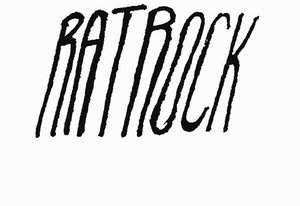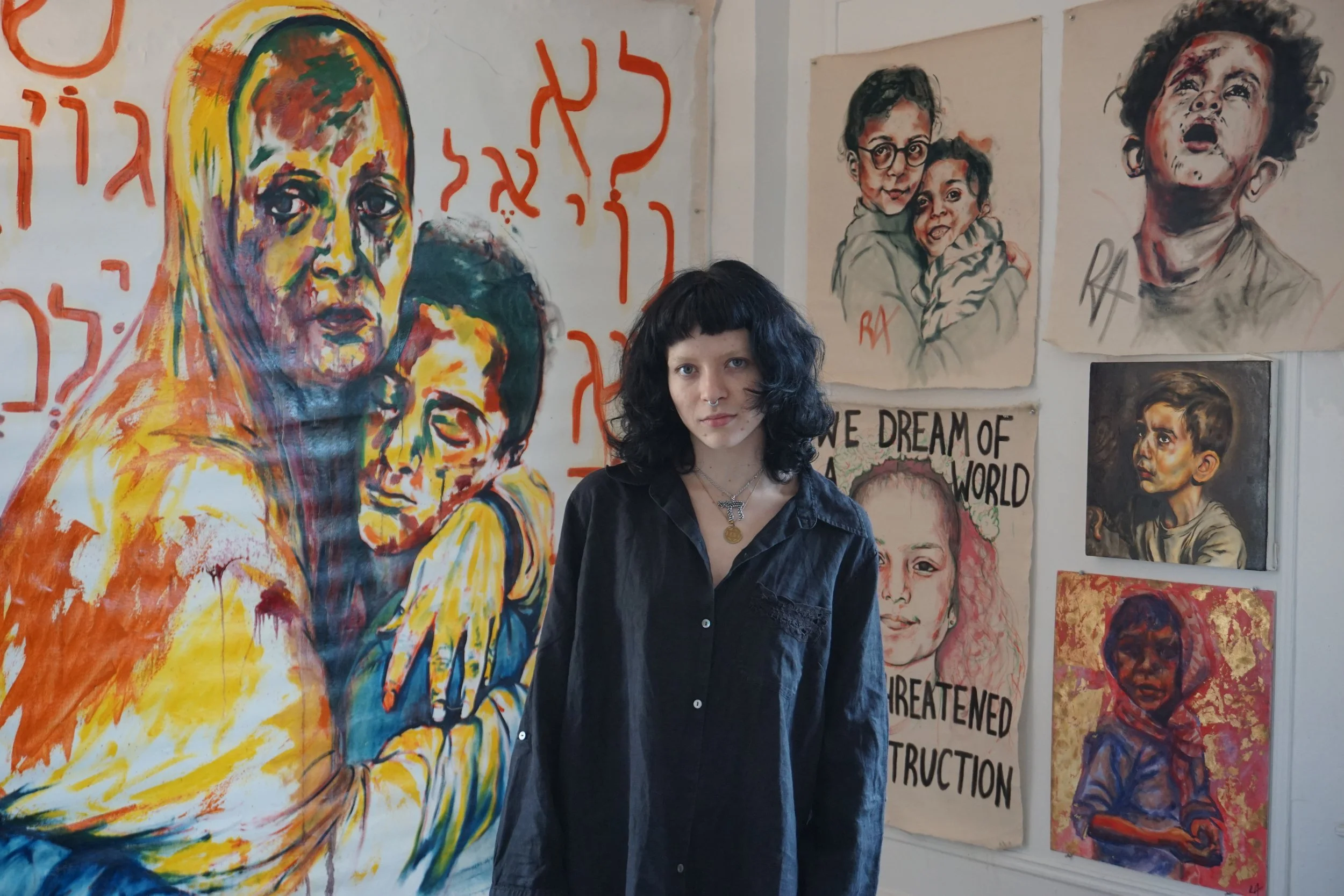Feature by Sayuri Govender
Photos by Arden Sklar and Audrea Chen
Ariana Eftimiu (BC’ 25) is a senior at Barnard majoring in Political Science and Human Rights. She has been writing for years, using poetry as a method to find and unravel meaning. She also runs an online magazine, Potted Purple, with her childhood best friend since they were 17. For her, poetry has been a medium for catch and release for years. In our conversation, she reflected on the temporality of her poetry, collaging beloved forms of media, and creating space for artists to thrive.
When I enter Ariana’s bedroom, the first thing I notice is how thoughtfully and artfully each decoration is placed on her walls. She walks me through each image, tchotchke, poster, and sketch– with each having a deliberate meaning, position, and coordination with the rest of the decor. Next to her bed are a myriad of postcards, receipts, and photos sharing the same pink hue, while above her desk features large, dark, and haunting posters–representing her love of “everything black and white and a little scary”. Her friend Macy’s art is spread around the room, as well as images of her favorite Depeche Mode album and memorabilia from her favorite restaurants and cafes. This thoughtfulness and sentimentality for her world extends deeply into her writing.
Her process for writing a poem always begins with an “impetus to write”. She describes to me the sensation of being struck with the “need to write about this”. First, the moment must fully pass, and only in its aftermath she writes most honestly. “I need to act on the desire to write or it'll die” she confesses, explaining that the truest feelings expressed in her poetry are the ones first put down on paper. With her poems, she hopes to conjure a distinct and palpable image for her readers, expressing that “ I really want us to be seeing the same thing”. Her writing is both melodic and visual; as she muses that a poem exists almost as a collage of “what does this feeling sound like and what does it look like? How can I make it very clearly look like that to other people? How can I make them see what I'm seeing?” She reveals that each poem has a set of songs that goes alongside them, with meticulously crafted Spotify playlists titled after them. (At the end of our conversation, I confess that I share the same intensity for crafting Spotify playlists for each moment of my life. We laugh and share in our love for writing, music, poetry, and the devotion to it all, and she immediately follows my page.)
As she describes her efforts to conjure images through her poetry, she also jokes how her mother and her sister are incredible visual artists and painters, but she can barely draw–so the gene must’ve skipped her. Then why poetry? Ariana states that “poetry is extremely honest–it's honest even when it's evasive. I like that it can hide something to an extent. There's a thin veil over everything, but otherwise, all of it is confessional” The abstraction of a raw confession is sown throughout Ariana’s poetry. She invites you into her world, to see, hear, and feel what it's like, and put your own meaning into it. (She may even write about you, but can obscure it enough that you might never truly know.) Her work is “an open letter to whoever is willing to understand it.” In a way, it is how she paints.
Within her poetry, Ariana works to understand her place in both suburbia and the city. She grew up directly across the Hudson River, telling me how she stared at the New York skyline from a secret corner of the woods only accessed through a hole in the fence. Her poetry is evocative and critical of the suburban, portraying high school imagery of cars, pool parties, and sneaking into the garage, as well as the loneliness and conformity of it all. Yet, when she works to characterize New York City, she tells me “it is not necessarily less lonely than a suburban area. There's loneliness and struggle in both spaces”. She reflects, now on the other side of the river and embedded in the sparkling skyline, that “a space will not be your saving grace. You need to be your own saving grace, and you can find it in community and people–that love is what makes the space what it is.”
For Ariana, poetry is a reckoning. She writes and encounters yearning, anger, femininity, and sweetness. She tells me how she finds beauty in the fact that poetry is open-ended and can exist without arriving at an answer. Furthermore, she tells me how poetry helps her sift through these emotions, working through wants and desires within the words, expressing how “a poem grounds them as things that can be ethereal and linger in the air, while still being incredibly real”
I find that her work takes these huge emotions and grounds them in specific, intricate, direct things. Her poem “mandarins and roses at the dinner table tonight” starts with “he colors me in, red and white plaid, / poppy on the kitchen table.” In a few words, she evokes a simple yet profound image. She tells me that her ability to see poetry in the mundane comes from her belief that “poetry can make things that are delicate and quiet be seen with a new importance.” She jokes that she might care too much, but that care is what drives her passion for her work. “My overarching sentiment is that everything is that deep,” she adds “and writing about something super mundane is choosing to be inquisitive about it and choosing to ask: what is the significance that this small thing has to me? The beauty of feeling and the beauty of poetry is that they're very constant. It's like listening to a song that was also one of your favorites 10 years ago.”
More recently, she has tried a more outright, staccato style in her poetry with the poem “THE DOW WILL TRADE ALMOST FORTY FIVE THOUSAND POINTS THIS YEAR & YOU EXIST HERE BY CHOICE OR BY FORCE”. In it, Ariana chronicles a desire to “return to a world where art governs,” revealing to me how “that poem came out of a frustration that art doesn't seem to matter. I've interviewed professors and I've talked to friends about this, and it seems like there's an overarching feeling that to be an artist, you must consider what you have to give up” I am stuck on the “return”--has this world existed, or will it? Ariana tells me the want to “return” is born from watching dissent of public trust in journalism, the difficulties of getting published, the loss of funding for the arts, and the inability to get your art into different spaces. She also adds that “‘return’ is also idealistic because it's this world that doesn't entirely exist, but it definitely could. It would just take a giant breaking apart and restructuring [of our society].”
However, Ariana has been working to provide these spaces for artists since her sophomore year of high school, when she and her best friend Nina Evans decided to make an online magazine: Potted Purple. Their website describes how the magazine was “built from a shared dream to collaborate with other creatives in an effort to foster a community of art and writing; encouraging their community to advocate for what matters and vocalize what is on their minds.” Ariana expresses how they wanted to create a magazine with no barrier to entry which young people can get their work published in. Since its founding in August 2019, it has grown a following of more than 3,000 people, with submissions from over 35 countries in its 13 published issues. Furthermore, it partners with Universal Music’s program that boosts musical and artistic projects by 18 to 24-year olds. This has allowed Ariana and Nina to interview a multitude of artists for the magazine, such as Jon Batiste, Billie Marten, and Ariana's favorite, Vlad Holiday. Because of the magazine, they have attended once-in-a-lifetime concerts and music events and followed their passion for loving and dissecting all things music. Yet, even with its continued growth and success, Ariana confides “I think it'll always feel like an idea that we came up with sitting in our hometown tea shop together.” Nina and she have spent the past years side-by-side, both making their way to New York City for college and being able to continue not only the magazine but their love for songwriting together and exchanging their art. She tells me that talking to other creative people is such a lifeblood–it is so important.” Our conversation leaves me feeling the same way. Her infectious enthusiasm for poetry, music, and art, as well as her passion for both pursuing it and opening doors for others is incredibly inspiring.
Her efforts in pursuing her art are meticulous and deliberate. She often feels that her poetry and her magazine are a “lore drop” that completely dismantles her image as a poli-sci major. Yet, her art is not an afterthought, but the center of her life. She has worked to strike a balance between her academics and her art these past four years and thus follows every small spark of creation. Whether it's 11pm and she realizes she needs to go play piano and write a song, or at the kitchen table after everyone’s gone to bed writing the poem that struck her earlier in the day, Ariana always fans the fires of her art.
She hopes in her future that she never loses sight of her artistic practices, and maintains her wonderful devotion. She recognizes that in college it often seems like we have no time for these endeavors, but we don’t realize that we do, we can, and we should.






































